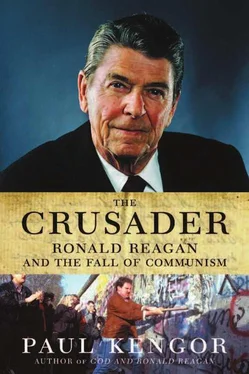5, 2004. Kennedy’s statement was also posted on the Web site of the Reagan Library and Foundation.
12. Dan Pavel, “Superpower United States: From Reagan to Bush Jr.,” Bucharest Ziua, June 14, 2004. Published by FBIS as “Romanian Daily Praises Reagan Role in Ending Cold War, Rejects Anti-US Attitude.”
13. Alexei Pankin, “Revising Reagan’s Role in Soviet History,” The Moscow Times, June
15, 2004.
14. Statement from the Polish news agency PAP, “Former Polish President Says Reagan Helped to Overthrow Communism,” June 5, 2004. Published by FBIS as “Former Polish President Says Reagan Helped to Overthrow Communism.”
15. “A Salute to a Great President—And A Modest Proposal,” Budapest Business Journal, June 14, 2004.
16. Vladimir Isachenkov and Jim Heintz, “Reagan Mourned in Former ‘Evil Empire,’” Moscow Times, June 7, 2004.
17. Gillian Flaccus, “Immigrants from Former Soviet Union Mourn Reagan,” Associated Press, June 9, 2004.
18. Quoted in “Asia Remembers Former US President Reagan as Friend, Vanquisher of Communism,” Paris AFP (North European Service), June 6, 2004.
19. Mohammad Ashraf Azeem, “Ronald Reagan’s America,” Islamabad Khabrain, June 9,
2004. Translated and published by FBIS as “Pakistan Columnist Lauds Ronald Reagan’s Policies, Period,” June 9, 2004.
20. Those future generations can look back with thanks to a number of Cold War leaders: John F. Kennedy and Nikita Khrushchev stepped back from the abyss, and many more were dedicated to avoiding that fate, from Truman to Carter. But it was Reagan and Gorbachev who were there at the end—an end completely unforeseen when Reagan arrived at 1600 Pennsylvania Avenue in January 1981. Those two leaders deserve special gratitude for ending the Cold War peacefully, with no nuclear weapons launched.
21. In mid-September 1961, Reagan spoke to the Press Club of Orange County, California. “There can be only one end of the war we are in,” said Reagan firmly: “wars end in victory or defeat.” Schweizer, Reagan’s War, 35, in which he cites “Warns of Red Menace: Film Star Ronald Reagan to Speak,” Bakersfield Californian, September 16, 1961, 19–20; and Ronald Reagan, “Encroaching Control,” Vital Speeches of the Day, September 1961.
11. Gorbachev, Memoirs, 216.
12. Mikhail Gorbachev, On My Country and the World (New York: Columbia University Press, 2000), 26.
13. Gorbachev, Memoirs, 177.
14. Ellman and Kontorovich, eds., The Disintegration of the Soviet Economic System, 2–3, 26.
1. Reagan, “Remarks on East-West Relations at the Brandenburg Gate in West Berlin,” June 12, 1987.
2. Ibid.
3. Interview with Peter Robinson, October 8, 2004.
4. Studio 9 Program, June 18, 1987, published as “Studio 9 Participants Discuss Reagan’s
Recent Speeches,” in Foreign Broadcast Information Service, FBIS-SOV-19-JUN-87, June 19,
1987, A1–10.
5. Gorbachev, Perestroika, 199.
6. This is almost verbatim what he had written in Perestroika. See Gorbachev, Perestroika,
200; and Brown, The Gorbachev Factor, 244–45. According to Brown, not until February 1990
did Gorbachev tell West German Chancellor Helmut Kohl that it was up to the Germans to
determine the kind of state they would have and on what timetable. At this point, of course,
the matter was well out of Gorbachev’s hands. To his credit, Gorbachev kept Soviet troops out
of the process, though, again, such a solution at that point would have been almost impossible.
1. Barnes, “Victory in Afghanistan,” 91.
2. Tarasenko is quoted in Wohlforth, ed., Witnesses to the End of the Cold War, 141. 3. Barnes, “Victory in Afghanistan,” 87.
4. Crile, Charlie Wilson’s War.
5. John Lewis Gaddis, U.S. News & World Report, October 18, 1999, 43. 6. I’m indebted to the research of Stephen F. Knott, who identified these examples in his
“Reagan’s Critics,” The National Interest, Summer 1996, 72.
7. Russell Watson and others, “Inside Afghanistan,” Newsweek, June 11, 1984, 55.
8. Russell Watson and John Barry, “Insurgencies: Two of a Kind,” Newsweek, March 23, 1987, 32.
9. Richard Cohen, “Why Aid Afghanistan?” Washington Post, January 2, 1985, A15; and Richard Cohen, “The Soviets’ Vietnam,” Washington Post, April 22, 1988, A23.
10. Gorbachev, Memoirs, 171, 197, 365, 138.
11. Adelman, The Great Universal Embrace, 228.
12. I’m indebted to military historian Tod Reiser for this insight.
13. These are the words of Congressman Charlie Wilson. Crile, Charlie Wilson’s War, 522–23.
14. I found at least a half dozen clear wall calls before Reagan’s June 12, 1987 speech, including the three occasions prior to his presidency. Further, I found an additional nine wall calls or affirmations made publicly by Reagan between July 24, 1987 and August 12, 1988, and there may well have been more. Here are examples of Reagan calling on Gorbachev or the USSR to tear down the wall (this is not a complete list): Reagan, “Remarks to the Captive Nations Conference,” July 24, 1987; Reagan, “Remarks on Soviet-US Relations at the Town Hall of California Meeting,” Los Angeles, August 26, 1987; Reagan, “Remarks at the 40th Anniversary Conference of the United States Advisory Commission on Public Diplomacy,” September 16, 1987; Reagan, “Radio Address to the Nation Following the North Atlantic Treaty
1. Reagan, “Remarks and a Question-and-Answer Session at the University of Virginia,” Charlottesville, Virginia, December 1988.
2. Reagan, “Remarks to the National Chamber Foundation,” November 17, 1988.
3. Reagan, “Farewell Address to the Nation,” January 11, 1989.
4. Ibid.
5. Andrew Nagorski, “Reagan Had It Right,” Newsweek, October 21, 2002, 68.
6. Gennady Vasilyev, “A Political Portrait: Reagan’s Best Role,” Pravda , January 20, 1989, 6. Published in The Current Digest of the Soviet Press, 41, no. 3 (1989): 1.
7. This information was shared with me by Zawitkowski. Interview with Chris M. Zawitkowski, November 9, 2005.
8. Reagan gave the crucifix to his friend Bill Clark, who donated it to the Villanova Prep School (Order of Saint Augustine) in Ojai, California in June 1984. Chris Woodka, “Secretary of Interior Clark honored,” San Francisco Chronicle, July 7, 1984.
9. Daniel Yergin and Joseph Stanislaw, The Commanding Heights: The Battle for the World Economy (New York: Simon and Schuster, 1998), 273–74.
10. Gorbachev, Memoirs, 478–79. In a 1993 conference at Princeton, Sergei Tarasenko spoke of how the nation elections in Poland in June 1989—in which Solidarity emerged the big winner—convinced him and the Soviet leadership, particularly the foreign ministry, that the Soviet system would break up. Wohlforth, ed., Witnesses to the End of the Cold War, 112–13.
11. Bernstein, “The Holy Alliance,” 28–35.
12. Carl Bernstein and Marco Politi say $50 million in total. Peter Schweizer says $8 million annually. Other estimates seem close to these. Bernstein and Politi, His Holiness, 357; and Schweizer, Victory, 75–76.
13. So was Voice of America (VOA). Along with sources in the Western Hemisphere like Radio Marti, which penetrated Cuba, RFE and VOA were among Reagan’s favorite projects. These forces of freedom were put under the control of Reagan’s close friend, Charles Wick, who headed USIA. Some of them—Radio Marti in particular—were considered way too provocative by the State Department. It was a continuing battle for Wick to get them up and running; only because of Reagan’s full support did Wick succeed.
Читать дальше












